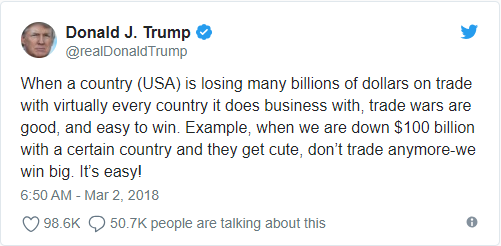In a post from last week, Tim Worstall explains why Donald Trump is wrong about the economic impact of a trade deficit:
I should note here that I didn’t, because as a foreigner I can’t, support The Donald at the last election. But I didn’t support Hillary even more. So this is more about really, actually, insisting that Trump is wrong on trade issues rather than just the more general he’s wrong about everything common in the US press.
[…]
What Trump, DiMicco and Navarro are getting wrong is this, the GDP equation.
Y = C+I+G+(X-M)GDP is consumption plus investment plus government spending plus the trade balance – and minus it if there’s a trade deficit. So people look at this and think yep, if there’s a trade deficit than that makes Y, GDP, smaller!
But this is a mistake, an error. For, as the textbook immediately goes on to explain, what is it that we do with imports? Well, we either consume them, use them in investments or government buys them. So all imports are already in C and I and G. Meaning that if we don’t deduct them we’ll be double counting them. So, to avoid double counting we subtract them.
Trump and his advisers are simply wrong on this. The trade deficit doesn’t reduce the size of the economy. They’re getting it wrong simply because they’re not reading the second page of the explanation of the GDP equation.





Trade wars are not about trade really. They are about showing your constituents how much you care about them, and showing them you are willing to fight for them. (and pandering to companies that scream that they need protection) The guy sitting in middle America wondering why the manufacturing jobs all moved overseas doesn’t give a rats ass about how the trade war is “wrong” and how the “GDP formula” works. He cares that some politician recognizes that jobs left the USA because other countries under cut them in production costs, and then sent the product back to the USA to make money. He wants them punished, in any way possible, for moving and closing shop and taking away those jobs but still making money selling their product in the USA.
The fact is that China holds their population hostage and can set their own price for labour at whatever they want. They don’t have to worry about labour unions forcing the price of labour up, they don’t have to worry about a mobile population following high cost jobs across the country because they control the cost of labour across the country, and I suspect they still control the ability of their own population’s ability to move internally.
Hard to blame companies from setting up shop where salaries are pennies compared to dollars, eh? As consumers we want to pay the lowest price possible, as workers we want the most money possible. Funny how you can’t have both though, and people don’t seem to understand that.
Comment by Dwayne — August 12, 2018 @ 22:17
An ordinary politician can adopt protectionist talk, but most economists agree that protectionism hurts a country more than it helps. The “help”, however, is localized and mediagenic, and the harm is widespread and hard to publicize in the same way. Even though the media as a whole are attuned to telling bad news stories (“if it bleeds, it leads”), the simple-but-wrong policies of a protectionist get generally better media coverage because you can put your newsfloozies at the factory gates when jobs have been “saved” and get lovely soundbites from the individual workers who are grateful that they got to keep their jobs.
I agree that China is a unique situation. Which is why the American government is busy picking trade disputes with Canada, Mexico, the EU, and everyone else.
Rhetorically, it’s easy to blur the distinction between “manufacturing” and “manufacturing jobs”. The US is still producing a lot of manufactured goods … more than ever … but thanks to higher productivity, they’re doing it with fewer workers. In the big economic picture, this is a good thing. From the point of view of individual industrial workers, not so much.
Comment by Nicholas — August 14, 2018 @ 09:18